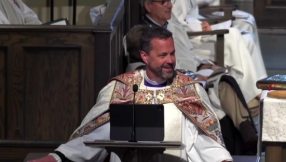
Research into Bible reading by the American Bible Society (ABS) has found that it impacts on generosity, compassion, and social attitudes.
According to the 2025 findings, Americans who regularly read the Bible are significantly more likely to report that Scripture influences their behaviour toward others.
More than half of practising Christians — those who attend church at least monthly and describe their faith as very important — say the Bible has led them to act more lovingly in the past month.
Among practising Christians, 55% “strongly agree” that reading Scripture helps them have more loving behaviour, compared with 37% of casual Christians and 33% of nominal Christians.
Even among non-Christians who have read the Bible recently, 39% say it inspired them to be more loving.
“God isn’t just 'up there'—he’s with us and within us and loving others through us,” said the report. “Our relationship with God is inextricably connected with how we act toward others.”
The report also finds a clear connection between Scripture engagement and generosity.
Nearly half of practising Christians (49%) say reading the Bible has made them more generous with their time, energy, or money — roughly twice the rate of those who identify as casual or nominal Christians (both 24%).
Even among non-Christians who read Scripture, one in three (32%) agree that it has made them more generous.
Drawing on wider philanthropic data, ABS reports that overall US charitable giving reached almost $600 billion in 2024 — a 6.3% increase from the previous year.
Yet while Americans remain generous, giving to religious causes has declined slightly after adjusting for inflation.
Within faith communities, however, Scripture engagement appears to make a tangible difference, as 86% of people who identified as “Scripture Engaged” said they give to charity, compared with 75% of the “Movable Middle” and 51% of those “Bible Disengaged.”
Their giving amounts also differ dramatically: Scripture-engaged donors report median annual gifts of $2,000 — four times higher than the $500 median among Bible-disengaged donors.
Evangelical Protestants top the charts in both participation and giving, with 78% donating to charity and the highest median annual gift being $1,500.
Historically Black Protestant churches follow closely, with high giving rates and the greatest share of donations directed to local congregations.
Meanwhile, mainline Protestants, donate a smaller portion of their charitable giving to their local churches — 40%.
Attendance patterns also play a role: 92% of those who predominantly attend church in person donate to charity, compared with 60% of those who participate mainly online.
Beyond money, ABS's State of the Bible report measures attitudes toward key social issues such as embracing immigrants, befriending people of other faiths or races, tend to the environment, and standing up for the oppressed.
While strong agreement with these statements has declined slightly among the general population since 2022, people who are more deeply engaged with Scripture remain the most supportive of such pro-social values.
Scripture-engaged Christians are especially likely to agree with statements about befriending people of other races or religions.
Interestingly, the only area where the “Bible Disengaged” outscore the highly engaged is in caring for the environment — 56 percent to 53 percent.
Women continue to show stronger support for compassion-driven causes, with 10 to 18% higher agreement rates than men across all five measures.
Generationally, Gen Z shows the greatest concern for the environment, Millennials lead in championing justice for the oppressed, and Boomers are most committed to building friendships across racial and religious lines.
Regionally, residents of the western United States express stronger support - 22% higher than other parts of the country - for welcoming immigrants.
Education also plays a role: individuals with college experience are 1.5 times more likely than those with only a high school education to strongly support inclusive and justice-oriented values.
Quoting from 2 Corinthians 9:7, the report reminds readers that true generosity is about more than financial output: “God loves a cheerful giver. It has always been a matter of the heart.”
It concluded: “Jesus said, ‘Where your treasure is, there your heart will be also’ (Matthew 6:21 NIV). In fact, he taught about money a lot. Not that he was raising funds for some new ministry project, but he understood the connection between passion and possessions. Riches can lure people into ruin. Money makes a bad master.
“But people who are motivated by the love of Christ find freedom in giving money away for good purposes—helping people, doing God’s work in the world. Financial donation is but one form of the generosity that floods the hearts of the faithful.
“Those who read the Bible most frequently are far more likely to agree strongly about its impact in their lives. As we regularly interact with God in Scripture, we are changed for the better.”













